- Home
- Charles L. Grant
The Last Call of Mourning - An Oxrun Station Novel (Oxrun Station Novels)
The Last Call of Mourning - An Oxrun Station Novel (Oxrun Station Novels) Read online
THE LAST CALL OF MOURNING
An Oxrun Station Novel
By Charles L. Grant
Digital Edition published by Crossroad Press
© 2012 / The Estate of Charles L. Grant
Copy-edited by: Paulo Monteiro
Cover Design By: David Dodd
Background image courtesy of:
http://mysticmorning.deviantart.com/
LICENSE NOTES
This eBook is licensed for your personal enjoyment only. This eBook may not be re-sold or given away to other people. If you would like to share this book with another person, please purchase an additional copy for each person you share it with. If you're reading this book and did not purchase it, or it was not purchased for your use only, then you should return to the vendor of your choice and purchase your own copy. Thank you for respecting the hard work of this author.
OTHER CROSSROAD PRESS PRODUCTS BY CHARLES L. GRANT
The Oxrun Station Series
The Grave
(More Oxrun Station books coming soon)
The Curse
Buy Direct From Crossroad Press & Save
Try any title from CROSSROAD PRESS – use the Coupon Code FIRSTBOOK for a one-time 20% savings! We have a wide variety of eBook and Audiobook titles available.
Find us at: http://store.crossroadpress.com
Chapter 1
A favorite place, a secret place, a world not bonded to grownups and growing: a veiled gap in a man-tall hedge, or a ten-plank tree house with rope ladders and codes, or the dark corner of an unfinished cellar behind the always warm bulk of a begrimed and sturdy furnace that purrs like a beast at home on the veldt. In the spring, wherever they are, they whisper promises of loving full moons and daring raids and living dolls and flashing steel that pricks no blood; in summer, wherever they are, they spawn pirates and ballerinas and quarterbacks and dragon riders, heroes and heroines with no thought of dying. And in November they are refuge, retreats, invulnerable barriers against the air that turns damp, the colors that shade grey, and the twilight that hovers between autumn and winter when the sun dies before supper and is reborn before waking . . . and the promise of soft cleansing snow is a falsehood grimly denounced when the streets turn black with yet another shower.
In Oxrun Station it was no different; and Cyd Yarrow in her dark mood wished for a moment that it could have been.
It was a lot easier back then, she thought, unwilling for a while to release the oddly comforting gloom. A lot easier when she was called Cindy. When her hair was still blonde without that tantalizing hint of strawberry, and she wore with what she'd hoped was a brave soldier's grin the gleaming silver-blue of a fence of braces and doused her face each night, each morning, with concoctions the ads said would keep her skin clear and the boys flocking round; when a football game was plaid blankets and groping and rising with every touchdown to scream so hard that throats were raw, could barely manage a laugh. When love was muted hues and distant violins and races across a meadow and huddling in a rain-spattered car and a boy/man grabs you by the shoulders in the middle of the street and kisses you and you don't care and kiss him right back.
Today, however, she felt as though she were attending a funeral.
A funeral whose centerpiece she almost thought she knew.
Her umbrella was black, raincoat black (despite the silvered buttons and red-wool lining), even the boots that hugged her slender legs to the thigh were black. She wore little make-up, and the eyes that someone once had called a soft porcelain blue were hard now and seemed ready to crack at the first tear. Her hair, long ago a cloud that settled on her shoulders, curled just slightly enough to give at her nape the illusion of length, swept left to right across her forehead to hide a faint widow's peak. Around it was a silk kerchief hastily tied beneath a chin barely rounded. Hastily tied, silk, and black.
She'd left the house immediately after lunch and had walked quickly, directly across the broad lawn into the trees that mustered at the rear. Elms. Oaks. One curious cage of white birch and a rough-barked pine. The undergrowth had been kept reasonably clear, and it was an easy hundred yards to a fast-crumbling wall that, when she was younger, was star-tall and heroic, now ancient and feeble; and she thought more than sadly that all she needed do would be to give it a shove and it would fall in slow motion outward into the forest that climbed the Station's surrounding hills. She hadn't been here in years, but she'd found the place without trying; and for the first time since waking a smile found her lips and coaxed them to part.
A favorite place. A secret place.
A small, unelegant shack her brothers Evan and Rob had built from loose fieldstone and plywood. It had been their fortress, castle, dungeon, clubhouse, complete with a secret exit that led through the wall and seldom worked after the rain bulged the wood. And when they were done and decided they hated it, they gave it to her with appropriate solemn ceremony. Here, then, she dreamed of traveling, of marrying, of loving, of princes and kings and fantasy wizards, sitting on the hardened dirt floor to entertain spiders and ants and a stray fly or rambling hornet. And once, she recalled as her smile grew wider, a praying mantis had perched on the threshold and stared at her for nearly ten minutes. It had terrified her, then calmed her; and once she dared blink and shift, it was gone . . . and she liked to imagine it had left under cover of a pale green fire.
A sudden gust dropped rain and dead leaves around her. She shivered, reached over and tried to open the latched door. It screamed wooden protest, gave an inch, gave another, and when a spider rushed out she started and leapt back, then laughed at herself.
"The famous world traveler undone by a bug," she said, one hand lightly touching the shack's canted top.
One month ago, almost to the day, she'd returned to Oxrun from a trip her father had sponsored, refusing to allow her to touch her own savings. He told her that in decades past it was called the Grand Tour, a leisurely sweep through Europe, sampling the languages and the food and the rigors of first-class living. But now, staring at her childhood huddling in the rain, she remembered little about it. The grassy beaches of Lausanne, the incredible traffic in Rome, the melancholy of scum-covered canals in Amsterdam . . . too many images, too much excitement.
When she came home, she'd been breathless. Bubbling. Dozens of rolls of film aching to be developed.
A month later she was bored.
In Oxrun Station there was no Louvre or National Gallery, neither Sacre Coeur nor windmill profusion. Here, the Chancellor Inn and the Mariner Cove were the nightspots for the young, special dinners for the family; the community college with occasional film festivals, the library and its readings, the churches their fairs, the park its games when the weather was fine.
Cyd shook her head slowly, wondering how she'd stood it all these years without screaming, without ranting, without scrambling for escape.
She scolded herself then, knowing it was her flair for the utterly melodramatic that had tainted the November gloom with an overlay of her own. Post-Thanksgiving let-down. Perhaps, she thought; yet it didn't stop her wishing, just for a moment, that there was something more to the village than a shrouded, untraceable history.
Another gust, stronger, and the umbrella was nearly torn from her hands. She braced herself until the wind died. Another glance at the shack, and she turned to make her way back. Stopped and stared at the house bulked before her.
Sighed.
The older she grew the smaller it became.
Now merely an oversized house, once it had been a massive block of G
eorgian brick-and-marble with, on this side, iron-railed balconies for the three second-story bedrooms (her brothers' on the corners and hers in the center); and below, a house-long patio of flagstone and slate surrounded by a low, sculptured brick wall with planters at intervals where nothing seemed to grow no matter how her mother tried. On her left, below Evan's rooms, a trio of wide windows to mark the country kitchen; in the center a wide glass entryway opening to the main hall; and on the right French doors that set off the library—a cavern of books and periodicals she'd been unable to touch until she'd picked up her degree and her father thought her ready.
And between the trees and the house, two acres of what Evan once called the family's virgin plot—no flowers, no fountains, no topiary . . . just grass. Over there was croquet when the aunts and uncles came, and there touch football, and there vicious badminton. It should have been English, she thought, and Victorian, and the women should have had parasols and the men unruffled grey coats.
Now she was older, and now it was so . . . small.
God, she wondered, how did I stand it?
She was ready to return to the shack and her past, when the hall door swung open and Evan stepped outside, waving to her frantically. She almost waved back, hesitated when his hands grew to fists, then ran across the rain-soaked yard. Frowning, but not worried. Darting through one of the gaps in the patio wall while she struggled to fold the umbrella, failed and tossed it angrily aside. By the time she'd reached the door, Evan had taken her arm and was pulling her down the hardwood floor toward the front.
"She's done it again," he said, gasping, his lean face more pale than usual, his curly black hair plastered wetly against his forehead as though he too had been outside.
"What's she done now?" she said, taking back her arm with a yank.
"What does Mother usually do?" he said. "She's fallen again."
"Oh, God," she said, more wearily than anxiously. "What now, painting a ceiling?"
"Papering the nursery."
"Great. Just great. Not a kid in this place for a million years, and she has to paper the stupid nursery."
Evan said nothing, only raced to the second floor.
The house was cored by a squared-spiral staircase carpeted a deep and soft brown, bannister and posts waxed and mirror bright. The landing itself extended into a corridor that led left and right to the rear bedroom suites, became a double-sized hallway that swept toward the front. Along all these stretches paneling reached to the ceiling without being broken by portraits or prints; a light knotted pine that despite faint dust gleamed like glass from a century of cleaning. Gaslight and amber globes now flickering electricity. Carved wooden sconces and pale white tapers that seldom were used despite power failures and storms.
A muttering.
Cyd slowed, and stopped at the corner. On the left were the closed dark doors of her father's rooms, on the far right the newly white paint that marked her mother's. In a decorative alcove that stretched straight ahead for less than ten feet an oval stained-glass window of peacocks and doves where, as a child, she'd tried for a harlequin tan.
And between the alcove and her mother's rooms the family nursery.
Evan had already gone inside, and Rob was standing stolidly at the open door. He was Evan's opposite in temperament and color, but just as handsome, just as tall, with most of his weight impressively in his chest. When he saw her he stepped back a pace right away, his tongue licking at his lips, his eyes squinting behind gold-rimmed wire glasses. He shrugged when her brows rose in silent question, pointed, and she moved past him to stand at the threshold.
The room was smaller than it appeared from the hall, its toys long since jammed into two large closets, rocking horse cocked precariously on end in a far corner, a cedar chest beneath one of the curtained windows. The floor was littered with drop cloths and newsprint, strips and balls of Mother Goose wallpaper yellowed and stiff. She counted four red plastic buckets of warm water, a paste brush, half a dozen wastebaskets overflowing and shoved aside, and two paste containers open and drying. A short stepladder had been propped against the right-hand wall and at its foot, lay her mother. She was groaning softly and, at the same time, resisting Evan's efforts to slide a hand behind her back to help her sit up.
"For crying out loud, I'm not dead," she snapped at him in a voice that made sandpaper seem remarkably like velvet. She glared at him, glanced up and saw Cyd for the first time. "Cynthia, will you tell him I'm not—" She groaned again, slapped once more at his hand and pushed at him until he sat back on his heels. Then, sighing and using her elbows awkwardly, she struggled to sit up, took a deep breath and sniffed as though searching for a foul odor to be damned.
Her hair, an unashamed cloud-grey, was dotted with bits of plaster and paste and a few curling strands of brightly colored paper. Her face was the same, and the smock she wore carried medals of all the rooms she'd done herself, every shade, every design. It was, she often claimed, nearly as old as she was herself. Her lips were as thick as Rob's, and brighter; her eyes as blue as Cyd's, and softer. Only a faint delicate webbing about her mouth and blunted nose and carefully screened temples betrayed her to the fifty-five years she had already weathered.
"Mother," Evan protested in obvious resignation, "you could have broken your back."
"I didn't, though, did I?" she said, grabbing his shoulder and hauling herself to her feet, brushing carefully at her smock and the plain slacks bagging at the knees. Cyd took a quick step forward, frowning, worried, but only Rob had the foresight to ask her what happened.
Myrtle Yarrow shrugged. "I was on that idiot ladder, see—that confounded paper must be older than your father—and I reached out to yank down a strip and my foot slipped." She glanced at the floor-worn slippers on her feet, shook one experimentally and nodded. "No grip anymore, you see. I fell, that's all."
"But you landed on your back," said Evan sternly.
"Yes," she said, nodding again. "Yes, as a matter of fact I did. And no worse for the wear, I'll tell you. Now what's the matter with all of you?" she demanded abruptly. "I'm not in my grave yet, you know. Honestly, you'd think I was—"
"Mother," Rob said quietly, "you should be careful."
She blinked once, slowly, before putting her hands on her hips and glaring at them all. Then she took Evan's arm and led him back to the hallway. "I need a drink," she announced to her sons. "You boys will join me. Cyd," she said over her shoulder, "would you mind running to Bradford's? I have a bracelet waiting. For the party tomorrow."
"Another one?"
"Don't know what happened to the last one," Myrtle said blithely. "Must have lost it, I guess." She frowned, broke it and grinned as Evan moved toward the stairs. "Must be getting old, my dear, must be getting old. Please don't forget, will you?"
"But Mother . . ."
Cyd stopped herself, content with just nodding. Evan's diamond ring, Rob's diamond stickpin, her father's…she scowled as she tried to remember, then shrugged and gave it up. It was as though there were a jinx against jewelry in the house, with her mother the worst victim…or the most absentminded offender.
She heard their footsteps fading, their voices softening, and began a slow wandering around the room. Looking at the dying paper, the mottled walls, kicking once at the stack of new rolls behind the door. From the look of it, her mother was working wherever the old paper gave her the least trouble, and it reminded her too much of some ancient forgotten relic. Absently, she righted one of the buckets, scuffed idly at the debris and stood in front of the ladder. She grabbed its sides and shook it to test for stability. It did not move, and when she checked she could see nothing on any of the steps that might have been slippery. She sighed at her mother's incredible luck, left the room and closed the door behind her, her hands deep in the raincoat's pockets as she made her way back downstairs and across the slate foyer to the front door.
On her right was the living room, more used now than when she was a child; and on her left a massive room tha
t took up that entire half of the house. Her father called it the sitting room, where guests had to be entertained before dining and parties were held when there was no dancing. It was paneled, like the living room, in walnut from floor to ceiling, the inner wall split by two fieldstone fireplaces that in turn were separated by ceiling-tall doors that led to the dining room. And save for the oriental throws scattered across pegged pine, the entire area was decorated in browns and soft golds. It could have been a cold place where formality reigned, but her mother had seen to it early on that warm instead was its keynote and code.
At the moment Myrtle was stretched out on a slightly curved couch that faced the near hearth, her right arm trailing along the carved-wood back. She seemed to be suffering no ill effects from the fall, but Cyd thought one of her brothers ought to be calling Doctor Foster. That, however, would have to wait, she noted with a wry grin—now they were standing before her, their hands clasped behind their backs and looking for all the world like schoolboys trapped placing a snake in Mother's desk.
She called out softly, waved though she knew they would pay her no mind, and buttoned her raincoat absently as she stepped outside.
Despite its pretentions to size, the front of the house was weathered plain and unimposing. It faced a circular drive that enclosed the only garden her mother permitted, narrowing to a blacktopped lane that darted almost fearfully under a canopy of elm toward the Williamston Pike. A generation earlier spotlights had illuminated facade and flowers from sunset to midnight; now the only light came dimly from within, as if the glow had retreated from the grasp of the trees.
Cyd rubbed a thoughtful finger along the smooth line of her nose and jumped the four low steps of the half-moon porch to the cracked concrete walk that led along the outside of the circle to what had once been a row of stables, off the house's left side. The building was wooden, low and flat-roofed and badly in need of another coat of white. Where the stalls had been were five broad doors, one for each of them, hers on the far end where the trees blocked the bulk of the perimeter wall.

![[Oxrun Station] The Orchard Read online](http://i1.bookreadfree.com/i/03/17/oxrun_station_the_orchard_preview.jpg) [Oxrun Station] The Orchard
[Oxrun Station] The Orchard![Riders in the Sky - [Millennium Quartet 04] Read online](http://i1.bookreadfree.com/i/03/20/riders_in_the_sky_-_millennium_quartet_04_preview.jpg) Riders in the Sky - [Millennium Quartet 04]
Riders in the Sky - [Millennium Quartet 04]![Chariot - [Millennium Quartet 03] Read online](http://i1.bookreadfree.com/i/03/19/chariot_-_millennium_quartet_03_preview.jpg) Chariot - [Millennium Quartet 03]
Chariot - [Millennium Quartet 03]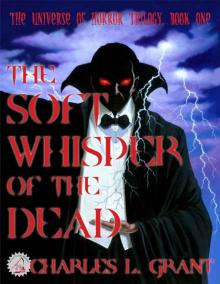 The Universe of Horror Volume 1: The Soft Whisper of the Dead (Neccon Classic Horror)
The Universe of Horror Volume 1: The Soft Whisper of the Dead (Neccon Classic Horror)![[Oxrun Station] Dialing The Wind Read online](http://i1.bookreadfree.com/i/03/19/oxrun_station_dialing_the_wind_preview.jpg) [Oxrun Station] Dialing The Wind
[Oxrun Station] Dialing The Wind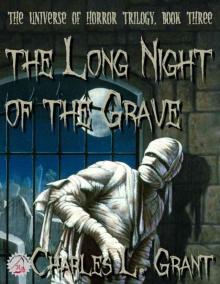 The Universe of Horror Volume 3: The Long Night of the Grave (Neccon Classic Horror)
The Universe of Horror Volume 3: The Long Night of the Grave (Neccon Classic Horror)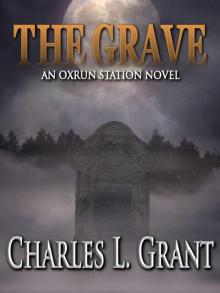 The Grave - An Oxrun Station Novel (Oxrun Station Novels)
The Grave - An Oxrun Station Novel (Oxrun Station Novels)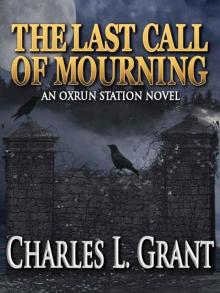 The Last Call of Mourning - An Oxrun Station Novel (Oxrun Station Novels)
The Last Call of Mourning - An Oxrun Station Novel (Oxrun Station Novels)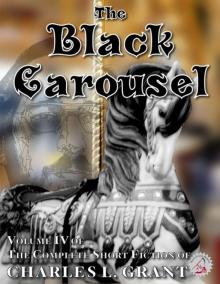 The Complete Short Fiction of Charles L. Grant, Volume IV: The Black Carousel
The Complete Short Fiction of Charles L. Grant, Volume IV: The Black Carousel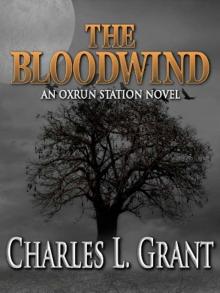 The Bloodwind - An Oxrun Station Novel (Oxrun Station Novels)
The Bloodwind - An Oxrun Station Novel (Oxrun Station Novels)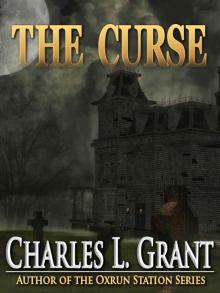 The Curse
The Curse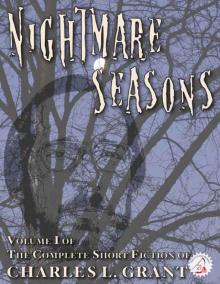 The Complete Short Fiction of Charles L. Grant Volume 1: Nightmare Seasons (Necon Classic Horror)
The Complete Short Fiction of Charles L. Grant Volume 1: Nightmare Seasons (Necon Classic Horror)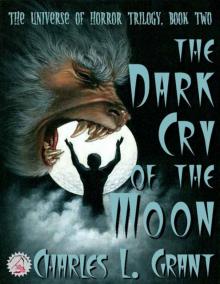 The Universe of Horror Volume 2: The Dark Cry of the Moon (Neccon Classic Horror)
The Universe of Horror Volume 2: The Dark Cry of the Moon (Neccon Classic Horror)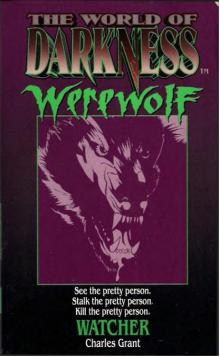 Watcher: Based on the Apocalypse (World of Darkness : Werewolf)
Watcher: Based on the Apocalypse (World of Darkness : Werewolf)![[Oxrun Station] The Bloodwind Read online](http://i1.bookreadfree.com/i/03/25/oxrun_station_the_bloodwind_preview.jpg) [Oxrun Station] The Bloodwind
[Oxrun Station] The Bloodwind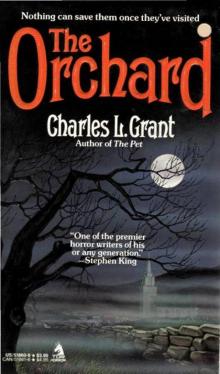 The Orchard
The Orchard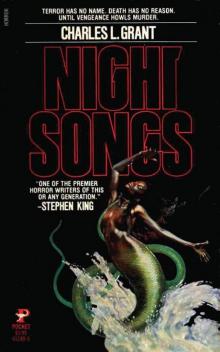 Night Songs
Night Songs Shadows 3
Shadows 3![Symphony - [Millennium Quartet 01] Read online](http://i1.bookreadfree.com/i1/04/02/symphony_-_millennium_quartet_01_preview.jpg) Symphony - [Millennium Quartet 01]
Symphony - [Millennium Quartet 01] The Hour of the Oxrun Dead (Necon Classic Horror)
The Hour of the Oxrun Dead (Necon Classic Horror)![In the Mood - [Millennium Quartet 02] Read online](http://i1.bookreadfree.com/i1/03/31/in_the_mood_-_millennium_quartet_02_preview.jpg) In the Mood - [Millennium Quartet 02]
In the Mood - [Millennium Quartet 02]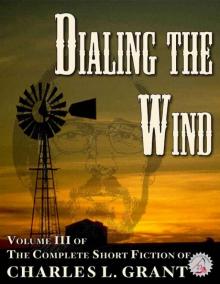 The Complete Short Fiction of Charles L. Grant Volume 3: Dialing the Wind (Neccon Classic Horror)
The Complete Short Fiction of Charles L. Grant Volume 3: Dialing the Wind (Neccon Classic Horror)![[Oxrun Station] The Last Call of Mourning Read online](http://i1.bookreadfree.com/i2/04/05/oxrun_station_the_last_call_of_mourning_preview.jpg) [Oxrun Station] The Last Call of Mourning
[Oxrun Station] The Last Call of Mourning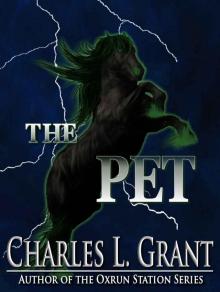 The Pet
The Pet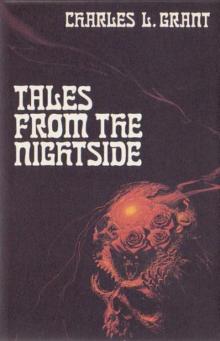 Tales from the Nightside
Tales from the Nightside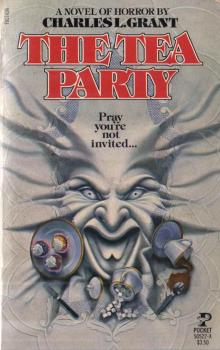 The Tea Party - A Novel of Horror
The Tea Party - A Novel of Horror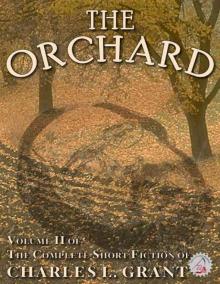 The Complete Short Fiction of Charles L. Grant Volume 2: The Orchard (Necon Classic Horror)
The Complete Short Fiction of Charles L. Grant Volume 2: The Orchard (Necon Classic Horror) Whirlwind
Whirlwind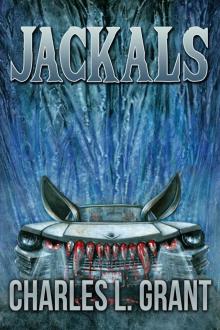 Jackals
Jackals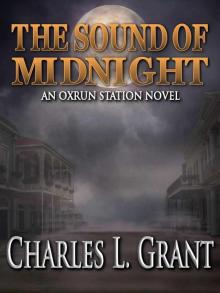 The Sound of Midnight - An Oxrun Station Novel
The Sound of Midnight - An Oxrun Station Novel